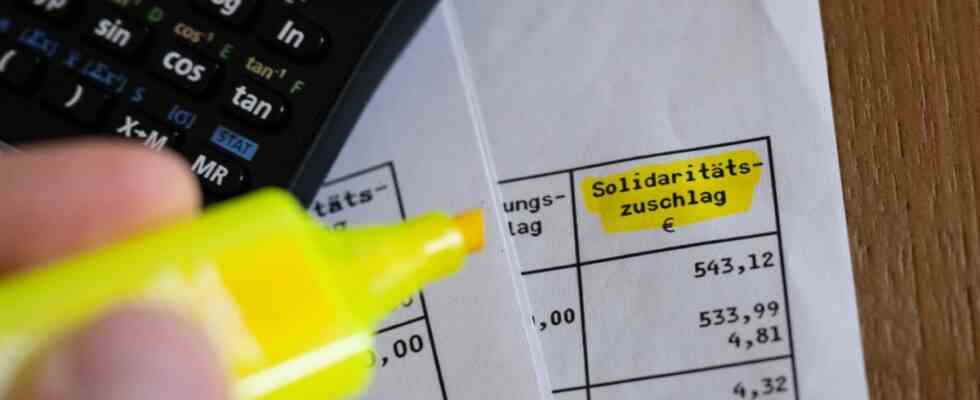The solidarity surcharge in its current form does not violate the Basic Law. This is the conclusion reached by the Federal Fiscal Court (BFH) in a judgment announced today in Munich (Az.: IX R 15/20). Nevertheless, the Federal Constitutional Court will probably still have to deal with it – but the judgment of the tax lawyers from Munich should be a strong signal.
The court “was unable to gain the necessary conviction that there had been a violation of the constitution,” said the chairman of the ninth Senate, Hans-Josef Thesling, who is also President of the BFH. The solidarity surcharge also meets the requirements of the Basic Law for the years 2020 and 2021, it continues to meet “the requirements that are to be made of a supplementary tax”.
A tax consultant from Aschaffenburg and his wife had sued. They had challenged the income tax and advance payment notices from the tax office in which their solidarity payments were fixed at the Nuremberg Finance Court. The judges there had reduced the couple’s payments, but essentially followed the view of the tax office. Although this judgment has now been overturned by the BFH, “solely for procedural reasons”, as Thesling said. “In the matter, the decision of the tax court is not objectionable.”
The ninth Senate had already discussed the case two weeks ago, but only briefly. The session was over after just 45 minutes, both sides had presented their points of view, and apart from formalities, the court had no further questions. Many observers had interpreted that in such a way that the judges saw the matter fairly clearly.
The soli was originally introduced as a supplementary tax to provide financial support for the development of the East German federal states after reunification. Everyone who paid income tax also had to give up part of their earnings. This was agreed as part of the so-called Solidarity Pacts I and II, and the Federal Constitutional Court also found it permissible.
The FDP would like to abolish the solos, the SPD not
After the Solidarity Pact II expired and the state financial equalization was reorganized, the solos continued to be levied – in 2020 still from all income taxpayers, afterwards only from a small part. Depending on the presentation, only between five and ten percent have to pay the fee. In addition, it will continue to be due on all payments of capital gains tax and corporate income tax. However, their volume is still enormous: in 2021 alone, a good eleven billion euros flowed to the tax authorities.
Money that Finance Minister Christian Linder (FDP) would prefer not to have at all: The Liberals have long wanted to abolish the solos altogether, but they were unable to assert themselves in the coalition negotiations between the traffic light parties. Shortly before the BFH hearing, Lindner then sent a political signal: the Ministry of Finance withdrew from the BFH procedure a few days before the hearing. Although this had no legal consequences, the new finance minister clearly opposed his predecessor, today’s Chancellor Olaf Scholz (SPD). Under him, the ministry joined the 2021 process.
Despite the verdict from Munich, the Federal Constitutional Court will still deal with the solos. Because in Karlsruhe, among other things, a constitutional complaint is pending, which was once initiated by the FDP politician Florian Toncar. The man is now Secretary of State for Finance. And the plaintiffs from the Munich case could also go before the Federal Constitutional Court.
If Karlsruhe then rejects the current regulation, it could still be expensive for the tax authorities. In extreme cases, the repayment of all solidarity payments made to the citizens after the expiry of the Solidarity Pact II could be threatened. In total, that would be around 40 billion euros plus interest for the years 2020 to 2022 alone. That would be possible because the levy has been in force since 2020 only provisionally raised will. This means that even if the income tax assessment is final, it can be changed again on this point. However, it is also conceivable that the constitutional judges will not ban the soli rules until a certain date in the future, but leave the funds collected up to that point to the tax authorities. Or they join the BFH and simply approve the solos.

